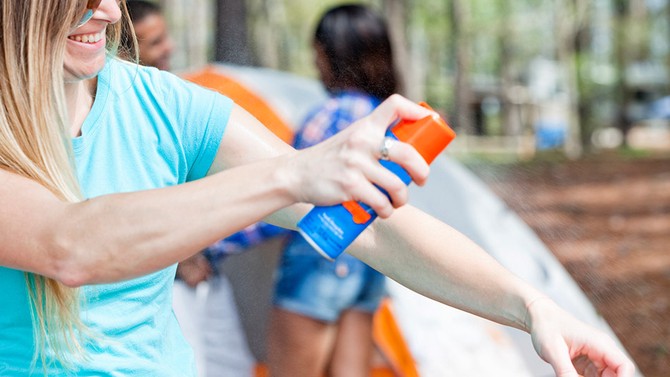The Right Way to Apply Bug Spray
Keep mosquitoes, biting flies and other pests at arm's length.
By Elyse Moody

Photo: The Voorhes
The Buzz About Bugs Is Louder Than Ever
Thanks to the rise of the Zika virus—a flu-like disease spread mostly by mosquitoes that has been linked to an array of birth defects—using insect repellent is becoming a no-brainer, just like slathering on sunscreen. You may be aware of what SPF you need and how often to reapply, but do you know the numbers when it comes to bug spray? Now's the time to find out: The CDC reported this spring that Zika may affect many parts of the U.S., and it's only one of several mosquito-borne diseases you'll want to ward off. Follow these three rules to protect yourself.

Photo: iStock/powerofforever
Check the Label
The most effective insect repellents include one of these active ingredients: DEET, picaridin, the chemical IR3535 or oil of lemon eucalyptus. "DEET, picaridin and IR3535 confuse an insect's sense of smell," says Kathy Cearnal, senior director of research and development for Spectrum Brands, which includes Repel and Cutter. "If a bug can't smell you, it doesn't know to bite you." Oil of lemon eucalyptus, on the other hand, acts as a true repellent, she says: "Insects don't like the smell, so they simply won't come near treated skin." The general rule is that the higher the concentration of the active ingredient, the longer the protection. For one to two hours outdoors, use a low level (5 to 10 percent) of picaridin or DEET; for a longer period (eight to ten hours) or a buggier situation, like a hike in the woods, use 20 percent or higher picaridin, IR3535 or DEET. Most products with oil of lemon eucalyptus come in a 30 percent concentration, which works well for up to six hours.

Photo: iStock/Jonathan Austin Daniels
Stay Protected
Depending on the mosquito population in your area, it may be more important to wear repellent for your morning walk than for dinner on the porch, but play it safe and use some whenever you're heading outside. For instance, Aedes aegypti, the main species responsible for Zika and chikungunya (a painful virus that swept through the Caribbean in 2015), bites primarily during the day, while a West Nile–spreading cousin attacks mostly at night.

Photo: iStock/keport
Apply Correctly
Order matters: Put on sunscreen first, let it dry for up to 30 minutes then spray insect repellent. You can apply DEET and picaridin products to your clothes (but don't put DEET on rayon or spandex—it'll damage the fabric) to prevent mosquitoes from biting through them. (Don't use any under your clothing; your skin should be able to breathe.) As with SPF, you may need to reapply more frequently if you're going to be in water or getting sweaty. And don't forget your feet! Mosquitoes often fly low to the ground and go for the ankles.
From the July 2016 issue of O, The Oprah Magazine

